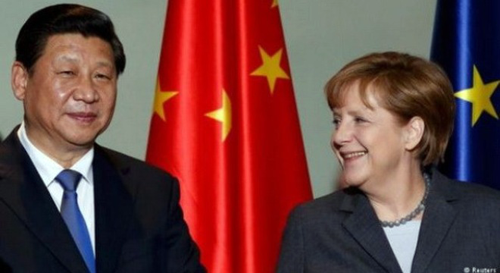Why do Germany and China "feel heavy feelings" for each other?
(Baonghean) - For 3 days starting from July 6, German Chancellor Angela Merkel will pay an official visit to China. This is Merkel's first visit to China after taking office as Chancellor for the new term, but her 7th visit to Beijing since holding the position of German Chancellor from 2005 to present. Why does Merkel attach such special importance to China, and on the other hand, what does China gain from strengthening relations with Germany?
 |
| German Chancellor Angela Merkel and Chinese President Xi Jinping. Photo: Reuters |
CGerman Chancellor Angela Merkel's official visit to China this time is considered an event that reaffirms the comprehensive strategic partnership that the two sides just achieved last March. Specifically, during the visit to Germany in March, German Chancellor Angela Merkel and Chinese President Xi Jinping at the German Chancellor's Office agreed to establish a comprehensive strategic partnership between the two countries. The joint statement includes 10 points towards a long-term strategic relationship and building political trust between the two countries, contributing to encouraging regular and open exchanges of views at the high political level... During this visit to China, Ms. Merkel's first stop is Chengdu, the capital of Sichuan province, Southwest China. Here, Ms. Markel will attend the 2014 China-Germany Dialogue Forum, then go to Beijing and have talks and meetings with Chinese leaders.
Explaining the recent steps to tighten and enhance the relationship between Germany and China, it can be said that as the two largest countries in the two continents of Europe and Asia, Germany and China have similarities as well as issues that bind each other. In terms of similarities, the leaders of Germany and China recognize that, as important national economies and influential countries in the world, Germany and China have important responsibilities for peace and prosperity in the world. But in reality, it is the bonds and interdependence that are the real thread connecting the close relationship between Germany and China.
First of all, the biggest bond is the economic and trade cooperation between the two countries. Germany is currently China's largest trading partner in Europe, while China is Germany's most important trading partner in Asia and an important market for German exports. According to data, since 2009, exports from Germany to China have doubled in 2013, reaching 67 billion euros - equivalent to 91 billion USD. Total trade last year reached 140 billion euros - more than 190 billion USD. Sebastian Heilmann, President of the German Mercator Institute for China Studies, emphasized that the strong development of economic relations between Germany and China is based on the fact that the two countries have complementary economies. In particular, Germany provides China with products that it needs for its industrialization process such as machinery and electronics, while Chinese consumer goods with very attractive prices are in high demand in Germany. Therefore, the German-Chinese economic relationship is one of the most important bilateral relations for Mrs. Merkel. Therefore, on this visit to China, Mrs. Merkel is accompanied by a large German business delegation, including CEOs of leading corporations such as Volkswagen, Siemens, Deutsche Bank. Currently, there are about 160 German companies operating in Chengdu, including the Volkswagen factory. A series of economic agreements are expected to be signed during this visit.
In addition to bilateral economic cooperation, as a European leader, Germany's efforts to promote trade relations with China are also aimed at resolving the consequences of the public debt crisis that Europe is still suffering from. This expectation is easy to explain because the European Union has long been China's most important trade partner and China is also the second largest trade partner of the European Union, after the United States. The total trade turnover between China and the European Union in 2013 reached 559 billion USD. Therefore, the comprehensive strategic partnership between Germany and China is considered an important component of the comprehensive strategic relationship between the European Union and China. In the context of the tense EU-Russia relationship related to the Ukraine issue, Europe, led by Germany, has more motivation to tighten trade relations with China. Because strengthening cooperation with the world's most populous country is considered a reasonable choice to partly offset the negative impacts of trade sanctions between Russia and the West. Meanwhile, Germany's stance is not directly opposed to China on international issues such as Ukraine, Syria, Iraq, etc., like Russia or the US. Therefore, it seems that Germany and China do not have any problems and tensions directly related to these hot spots.
As for China, many motivations have led Beijing to promote good relations with Germany. First of all, it is the goal of balancing its diplomatic strategy with the US globally. To compete with the US, China is currently seeking to expand its economic and political influence beyond Asia. Of these, Africa, Latin America and Europe will be the key destinations. For Europe, the gateway for China is Germany. According to analysts, after many years of prioritizing its relations with Russia and some neighboring countries, with a rather pragmatic policy in recent times, China has very few real allies. Therefore, upgrading relations with Germany is a diplomatic step that China must take to find new partners and allies. Another important reason that China wants to gain from Germany is to reduce the isolation that has been strongly condemned by the international community for its wrongdoings in the East Sea in recent times. And the key is the “economic olive branch” that China offers. Thus, despite some obstacles such as Chinese companies being frequently accused of stealing technology from German companies, and the latest accusations of China increasing industrial espionage activities; perhaps, with so many mutual ties, China and Germany will “feel heavy” for each other for a long time.
Phuong Hoa






